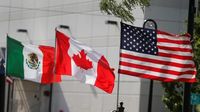The White House clarified on April 9, 2025, that Mexico and Canada will not be subject to the newly announced 10% tariff imposed by the United States, following earlier confusion stemming from an erroneous statement by U.S. Treasury Secretary Scott Bessent. This announcement comes after a tumultuous few days where the implications of tariff changes were a focal point of international trade discussions.
Initially, reports suggested that President Donald Trump had included Mexico and Canada in the list of countries affected by the 10% tariff, which was announced on April 2, 2025. However, the White House quickly rectified this misunderstanding, stating that the tariff would not apply to these two North American partners. "For Canada and Mexico, the current fentanyl/migration orders remain in effect and are not affected by this order," the White House emphasized, assuring that trade under the United States-Mexico-Canada Agreement (T-MEC) would continue without the additional tariff.
The confusion arose when Bessent, responding to a question about whether the 10% tariff included Mexico and Canada, replied affirmatively, leading many to believe that these nations would be subjected to the new tax. However, the White House confirmed that both countries remain exempt from the general tariff due to their existing commitments under the T-MEC.
According to the White House, products that comply with T-MEC regulations will continue to be tariff-free, while those that do not will incur a 25% tariff. This exemption is crucial for maintaining the smooth flow of trade between the U.S. and its northern neighbors, particularly in light of ongoing discussions about migration and drug trafficking.
On the same day, Secretary of Economy Marcelo Ebrard tweeted, "From Washington: I am officially informed that we are not included in the 10% reciprocal tariffs announced today. Regards." This message further confirmed the exemption status of Mexico and Canada, alleviating concerns among traders and businesses that rely on cross-border commerce.
Despite the clarity regarding the tariffs on Mexico and Canada, the U.S. government is still moving forward with a broader trade strategy that includes a 10% tariff on imports from many other countries. Trump has indicated that this measure is part of a larger effort to address trade imbalances and encourage domestic production.
Additionally, the White House noted that if the current fentanyl and migration orders are rescinded, products that comply with T-MEC would continue to benefit from preferential treatment, while non-compliant products would face a reciprocal tariff of 12%. This nuanced approach reflects the complexities of U.S. trade policy as it seeks to balance economic interests with national security concerns.
Overall, the situation is indicative of the ongoing tensions in U.S. trade relations, particularly with nations that have been historically significant partners. The announcement of the tariffs has already had a noticeable impact on the stock market, with indices like the Dow Jones and S&P 500 experiencing volatility as investors react to the shifting landscape.
In a related development, Trump has also announced a 90-day pause on the implementation of some tariffs aimed at countries that have not retaliated against his trade policies. This pause is intended to facilitate negotiations and potentially avert a trade war. During this period, the U.S. will reassess its position and the responses from affected nations.
As the trade landscape continues to evolve, analysts are closely monitoring the effects of these tariffs on the economy and international relations. The implications of Trump's tariff strategy are far-reaching, and the administration's decisions could significantly influence the future of trade agreements and economic partnerships.
In conclusion, while the U.S. maintains a firm stance on its trade policies, the clarification regarding Mexico and Canada serves to reinforce the importance of the T-MEC and the ongoing commitment to cooperative trade relations within North America. Stakeholders in both countries will be watching closely as further developments unfold in the coming weeks.






